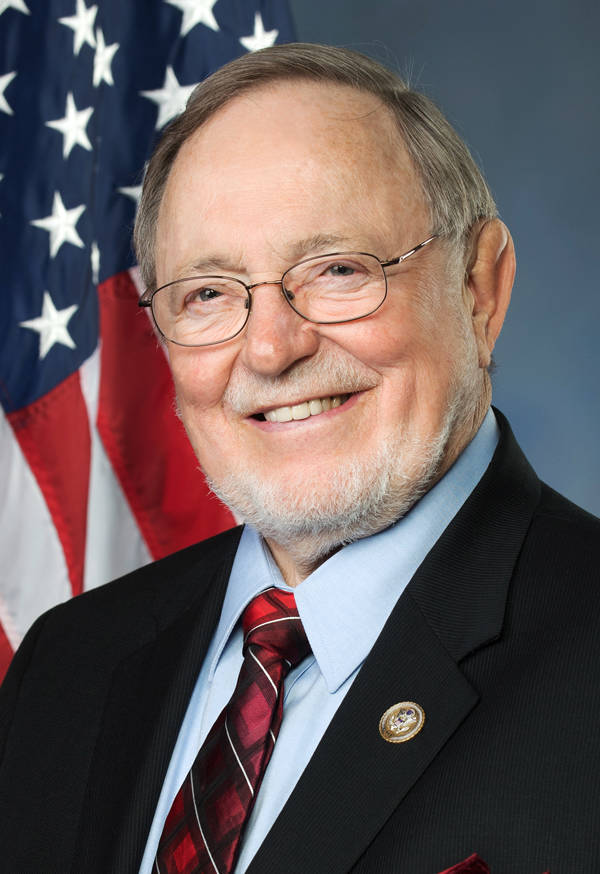Ahead of Tuesday’s election, the Clarion is publishing interviews with candidates vying to represent Alaskan communities. In our final set of interviews, we talked to Republican Rep. Don Young and Independent challenger Alyse Galvin, who are competing for Alaska’s only seat in the U.S. House of Representatives. The seat has been held by Young for 45 years.
Question: What would be your first priority as Congressman, should you be re-elected?
Answer: First priority is the same priority I’ve always had, which is listening to Alaskans and trying to solve their problems. That’s one of my main priorities. One of my other priorities is federal access to government land, and to have the ability for Alaskans to participate on federal land.
Q: With more and more school and mass shootings being reported in recent years, how do you think America can keep their schools safe?
A: There are numerous ways to do it. Number one is awareness. I’m not above having security come into the schools and maintain — like the airports. If we can keep our airports safe, we ought to be able to keep our schools safe. I believe that’s the appropriate way to do it.
Q: Reproductive health continues to dominate the Congressional conversation, with some people hoping to overturn Roe vs.Wade and defund Planned Parenthood. Where do you stand on these issues?
A: Keep in mind, Congress will not do that. It’s going to take the Congress and the numbers are not there. I am pro-life and always have been pro-life. That decision would be made by an act of Congress and at that time probably challenged and go before the Supreme Court and the decision will be made by the Justices.
Q: Many states have legalized marijuana in the last few years, including Alaska. Canada just legalized cannabis on a national level. How do you see the future of recreational cannabis in this country, in this state?
A: It’s a state’s issue and a state’s right. I’m vice chairman of the cannabis caucus. I do not use it and don’t believe in using it, but the people of the state of Alaska voted to legalize it and I have backed that up and will continue to back it up.
Q: The Kenai Peninsula and Alaska’s economy has long been dependent on oil and gas. What will you do to boost the economy here beyond oil and gas?
A: Well, on the federal level we can get the federal government out of the way of the state. The state has to be more aggressive. You know, there’s no reason why we’re not developing our other resources within the state and not be delayed by actions of the federal government or people who don’t want to do anything. This state is what I call ground zero for energy. We have all kinds of energy in the state. We’ve done nothing really to develop it. Potential hydropower and everything else we have other than oil and gas. My biggest suggestion, we are dependent on oil right now and we don’t do anything that can take and sustain an economic base. When the oil goes down we have no control over it; when it goes up we have no control over it. Consequently, we got to have something that will fill treasury up with another source of resources.
Q: Where do you see the future of the Arctic Wildlife National Refuge?
The refuge is still intact, other than the 10-02 area, and that was set aside in the Alaska National Lands Act for oil development if Congress voted to do so. That’s what we did under the tax bill. I’ve done that in the Congress 13 times to get that done. It’s the right thing to do. It’s where the oil is at and we should do it.
A: The Trump administration decision to impose steel tariffs has had an impact on the Port of Alaska in Anchorage, which already needs significant repairs, as well as potential impacts on pipeline construction — what’s your solution to making sure Alaska’s projects can operate affordably?
Q: The Port of Anchorage is not a good port, but it’s our port. It’s the Alaska Port. It’s where all the infrastructure comes in. What I look forward to is continuing to make it a good import port, and develop an export port. That can be done. We already have the beginning done out on MacKenzie Point. So, we’d have two ports here that could take out resources and ship them out and receive our goods that come in.
A: Health care costs have been rising in Alaska. What’s your plan to help create a more affordable health care system?
It’s an issue I believe has to be revisited by Congress on the federal level, not using Obamacare. We have to look at how we can improve the health care of each individual. It’s going to take a lot of work from a lot of different people. It can’t be done in the closed doors behind the Speaker’s office like it was done with Nancy Pelosi and the Democrat party.

